Health Equity
News
Penn SUMR Undergrad Minority Research Pipeline Program Turns 20
Two Decades of Channeling Students Toward a Health Services Research Career
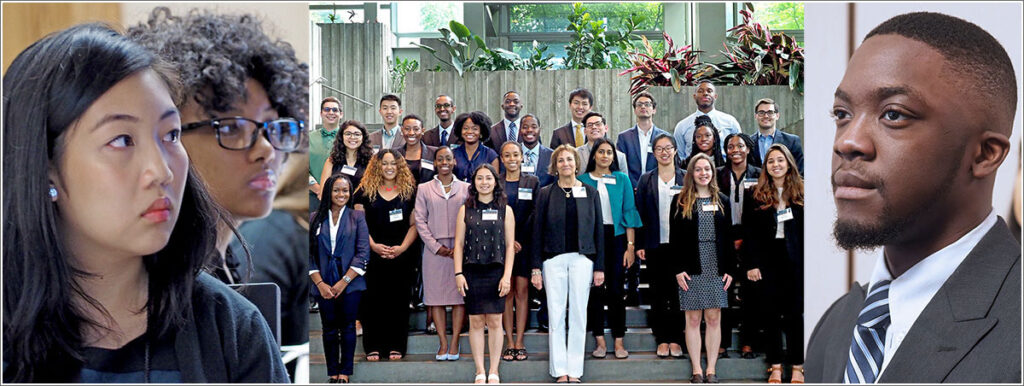
Twenty years ago, the Leonard Davis Institute of Health Economics (LDI) and Penn’s Wharton School teamed up to create the Summer Undergraduate Minority Research (SUMR) program to offer students the opportunity to spend three months exploring the career potential of health services research.
Throughout 2019, the Wharton School and Leonard Davis Institute of Health Economics’ Summer Undergraduate Minority Research (SUMR) program celebrates its 20th Anniversary as a University of Pennsylvania pipeline program for exposing underrepresented minorities to the potential of careers in health services research (HSR).
A special two-day celebration conference is being planned for July 29 and 30 and will bring together SUMR alumni and mentors.
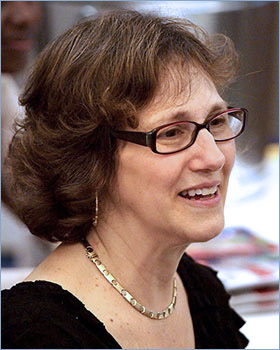
“It’s incredible to look back over two decades and think about all the incredible young scholars that have passed through here and gone on to achieve PhDs and other degrees that enable them to make their mark in health care,” said SUMR Founding Director Joanne Levy, MBA, who is also the Deputy Director of LDI and Associate Director of the Wharton School Health Care Management PhD program.
Levy, who has been both architect of the SUMR program and beloved earth mother to its student participants, oversees the annual process of winnowing down more than 200 undergrad applicants from around the country for about 20 slots in each annual SUMR cohort. The program is open to members of underrepresented minorities as well as others who are interested in research focused on health disparities and other minority health issues and first generation college students.
Intense, immersive program
The three-month long SUMR program includes an intense classroom curriculum taught by Penn faculty members and LDI Senior Fellows who are among the top experts in their fields. Each SUMR scholar is also taken under wing by two faculty mentors and directly involved in health services research projects for the duration of the summer. More than three dozen Penn faculty members and lab staffers volunteer to be SUMR mentors each year. A goal of the program is to immerse SUMR scholars in the daily life and work of Penn’s vibrant community of health services researchers.
Since its founding, more than 250 undergrad scholars have gone through SUMR in the last 19 years. The program has also become a model for similar undergraduate minority research initiatives throughout Penn as well as across the country.
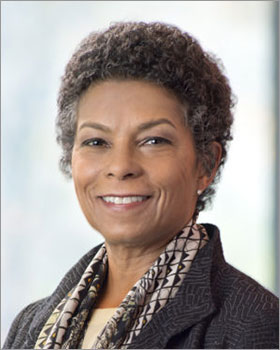
Despite the 15,000 scientists currently involved in this field across the country, health services research is little known outside of academia. It is a field of scientific inquiry focused on how health care delivery is organized, managed, financed and quality controlled throughout the United States. The studies and reports produced by HSR scientists inform and influence the political process, regulatory agencies and business executives at all levels of the health care industry. The fundamental issue addressed by the SUMR pipeline program is the lack of racial and ethnic diversity throughout the field that has tended to freight its findings and insights with a white-only perspective.
Researcher diversity
“The reason that it matters for people who have different perspectives to be engaged in this,” explained Risa Lavizzo-Mourey, MD, MBA, “is because often the perspective of social scientists determines the kind of questions they ask as well as how they frame those questions. Since we know that health care in this country — and many other countries — does not deliver the same outcomes for different populations of people, it’s important to get the broadest array of researchers asking questions about those important areas.”
Now a Penn Professor with appointments in the Nursing School, Perelman School of Medicine and the Wharton School, Lavizzo-Mourey previously served for fourteen years as President and CEO of the Robert Wood Johnson Foundation. And prior to that, during an earlier stint as a Penn faculty member, she was directly involved in the launch of the SUMR program.
First SUMR mentors
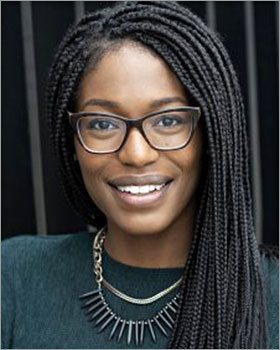
Mardieh Dennis, MPH, is a former SUMR scholar who will this spring receive her PhD from the London School of Hygiene and Tropical Medicine.
“Twenty-five years ago, when you went to meetings of health services researchers you generally saw that it was mostly men and mostly white men,” said Lavizzo-Mourey. “It was also a time when the question of ‘health care disparities’ was on the rise. The idea of a SUMR pipeline program was a concept that made sense and was consistent with my long-term interests and, so, I got involved.” She was a member of the small committee that selected the first SUMR scholars and also served as one of the first faculty mentors.
One example of the end product of SUMR’s influence on its participant students is Mardieh Dennis who went through the SUMR program before she graduated from Penn in 2009 with a BA in Health & Societies. She earned her Master of Science in Public Health degree at Johns Hopkins, spent several years in Zambia studying and publishing papers on health systems for maternal health in sub-Saharan Africa, and was accepted to the advanced studies program at the London School of Hygiene and Tropical Medicine from which she will receive her PhD this Spring.
‘One more black woman’
In a Tweet from Europe last August after Dennis saw an online feature about the 2018 SUMR cohort’s activities, she wrote “I did this program in 2007 with zero intention of ever doing a PhD. Fast forward 11 years and now I’m months away from submitting my thesis, so I guess they succeeded in helping to add one more black woman to the pool of health services researchers.”
Another example is Arrix Ryce who came to the SUMR program in 2017 from the University of Miami and is currently at the University of Oxford in London pursuing a MSc in Social Data Science. He has also been accepted at the Emory University School of Medicine to study for his MD.
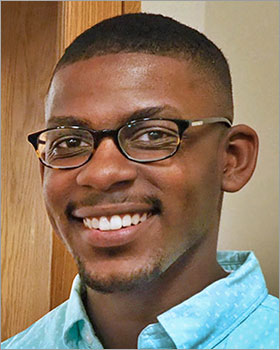
Arrix Ryce is a former SUMR scholar who is pursuing his MSc in Social Data Science at the University of Oxford.
“My SUMR experience was my first meaningful exposure to data science,” said Arrix who was mentored by Penn faculty members Scott Halpern and Kevin Jenkins — and I fell in love with it as I recognized how data embodies stories about health and health systems. Because of SUMR, I am on my way to being both an attentive physician and a skilled data scientist.”
Health disparities interest
Many of the students who apply for the SUMR program do so because at a young age they’ve developed an interest in the issue of health disparities.
“Every since I was little,” explained Bernice Fokum, a 2012 SUMR Scholar who is now an MPP candidate at Harvard and and MD candidate at Emory Medical School, “health always interested me. In the seventh grade I started looking into things like the obesity epidemic and disparities that happen to people who are in suburban schools versus those in urban schools. It fascinated me that health care was so disparate among different types of schools. My mission as I came to SUMR was to find the marriage between health care and social justice. I’m interested in how health disparities play out in the real world.”
And those real-world disparities are, in many ways, not only what SUMR is about but also what brought it into being in the first place.
Rise of the health disparities issue
During the late 1980s and throughout the 1990s, landmark federal studies and reports documented major disparities in the access, quality and outcomes of care generally experienced by African Americans and other minority patients versus that generally experienced by white patients. In 1999, the new Healthcare Research and Quality Act directed the Agency for Healthcare Research and Quality (AHRQ) — the federal government’s highest office of health services research — to begin compiling and publishing annual reports detailing the “prevailing disparities in health care delivery as they relate to racial factors and socioeconomic factors.” It also authorized new systems of grants aimed at alleviating “shortages in the number of trained (health services) researchers who are addressing health care issues for the priority populations.”
Simultaneously, the Clinton White House and Congress were hammering out what became the new law addressing the same issue — The Minority Health and Health Care Disparities Act. The legislation’s core goal was to “enhance biomedical and behavioral research on minority health and health disparities, support medical training for minorities and others, and improve the study and collection of data regarding minorities.”
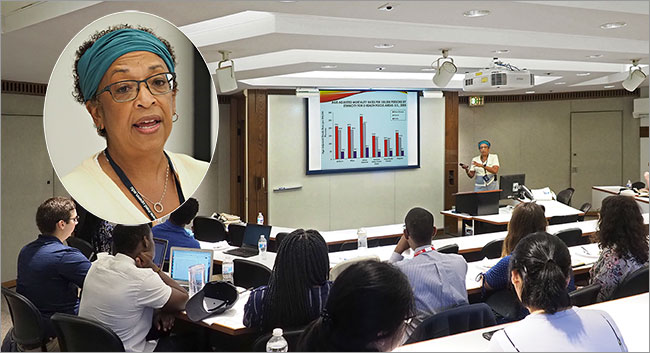
It was in this new national atmosphere of concern that a growing number of academic, philanthropic, and corporate institutions began organizing university-level pipeline programs designed to attract racial and ethnic minorities to health care-related degree programs. SUMR was one of those and the only one focused on health services research and that field’s potential to directly influence health policy at the highest levels.
The founding of SUMR
In 1998, a T32 training grant from AHRQ funded the planning, creation and 2000 launch of the SUMR program that was the vision of both Joanne Levy and Wharton Health Care Management Professor Mark Pauly who was the grant’s principle investigator. A committee consisting of LDI Senior Fellows Levy, Pauly, Lavizzo-Mourey and Jerry Johnson, MD, of the Penn Medical School, selected the first three students to be SUMR scholars. Three Penn faculty members and LDI Senior Fellows stepped up to be SUMR’s first mentors: Lavizzo-Mourey, Katrina Armstrong, MD, and Judy Shea, PhD.
“SUMR is unique in the way it takes students inside health services research, which few of them know anything about,” said Eve Higginbotham, SM, MD, Vice Dean for Diversity and Inclusion at the Perelman School of Medicine. “Health services research is not as accessible as seeing someone working in a lab on the biomedical side, even as its potential for impact reaches into the higher levels of policy making. SUMR is distinctive in the way it exposes students and provides a path toward being part of that. It’s one of Penn’s longest and most successful pipeline programs.”

Eve Higginbottham, SM, MD, Perelman School Vice Dean for Diversity and Inclusion and LDI Senior Fellow mentors a SUMR class.
One of the many who would agree with that is Lorraine Dean, one of four scholars in the second, 2001 SUMR cohort. She is currently an Assistant Professor of Epidemiology at the Johns Hopkins Bloomberg School of Public Health with joint appointments in both the Department of Oncology and Department of Health Policy and Management.
‘Lens of racism’
Daughter of a Kodak technician and an office worker, Dean moved with her parents from Fairfax, Va., to Lancaster, Pa. when she was 10 years old. “I grew up in a central Pennsylvania area where there were Ku Klux Klan marches and where our family was told we couldn’t buy a home in certain Lancaster neighborhoods because Blacks weren’t allowed there,” said Dean. “So, I always had a lens of disparities and racism, but early in my life I never made the connection that would tie those into health care.”
Dean became interested in health care during high school when she witnessed an aunt’s terminal experiences with cancer and began thinking about medicine as a potential career. Accepted to the University of Pennsylvania as a first-generation college student, she remembers arriving there “clueless” about what the health care field was really like and took first-year courses in a pre-med track.
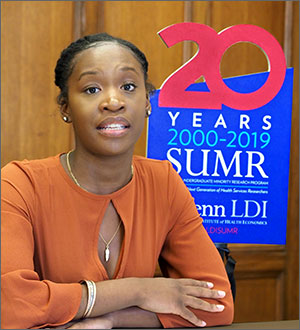
Associate Director of the SUMR Program for the last six years, Safa Browne is also a Penn student who receives her Master of Public Health (MPH) degree this May. She said her involvement in SUMR is what initially got her interested in a health care-related career.
In her second year, she began working as a research assistant to Katrina Armstrong in the Penn Medicine Division of General Internal Medicine. Armstrong, along with one of the other faculty members, Kevin Volpp, MD, PhD, told her about the new SUMR program that was accepting applicants for its second cohort in 2001 and suggested she apply.
‘Handprint on my career’
“When they started talking about ‘health research’ the first thing I thought was ‘I don’t want to work in a library’ because I thought that’s what ‘research’ was,” Dean said. “Then I spent the summer in the SUMR program and it opened to my eyes to an entirely new world of a science of interacting with patients and finding out what they need, what they think, and assessing what’s going on in the health care delivery system around them. The most powerful part was the daily connection to faculty members like Katrina and Kevin and David Asch, MD, MBA, and Jim Coyne, PhD, and others. Those experiences have a handprint on virtually every stage of my career since then.”
In 2005 after graduating from Penn with her BA in Biological Basis of Behavior, Dean received a William J. Fulbright grant to support her independent research project in Venezuela focused on women’s perceptions of self-breast exams. In 2010 she received her Doctor of Science degree in Epidemiology from the Harvard School of Public Health and returned to Penn as an instructor in the Biostatistics and Epidemiology Department. In 2016 she assumed her current positions at Hopkins. One of her most recent studies, co-authored with Katrina Armstrong, was the 2017 “Healthcare System Distrust, Physician Trust, and Patient Discordance With Adjuvant Cancer Treatment Recommendations” published in the journal Cancer Epidemiology, Biomarkers & Prevention.
Dean’s long-term collaborative relationship with Armstrong, who is now Physician-in-Chief at the Massachusetts General Hospital Department of Medicine, underscores the value and importance of mentorships.
Long-term impact
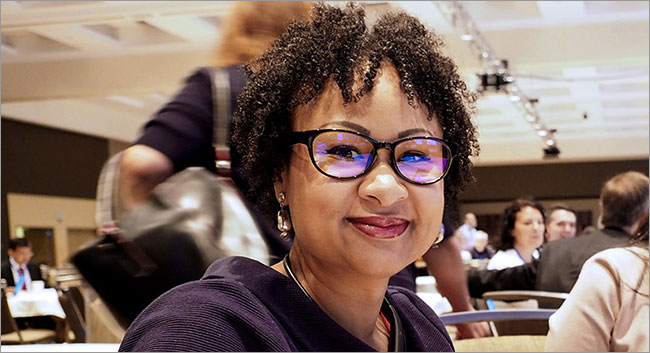
“In the SUMR program, both mentor and mentee get a lot out of it,” says SUMR mentor and Perelman School of Medicine Assistant Professor Meghan Lane-Fall, MD, MSHP who is also an LDI Senior Fellow.
“Being a mentor in the SUMR program is not a simple task,” points out SUMR Program Director Levy. “It takes a great deal of attention and energy over a three-month period and often continue to work with the mentee well beyond the SUMR program, and acknowledge the mentee’s work by naming them as a co-author when the project’s paper is published in various prestigious journals. We watch these kinds of career-long relationships develop between SUMR mentors and mentees every year. It’s one of the most gratifying parts of the program.”
Perelman School of Medicine Assistant Professor of Anesthesiology and Critical Care Megan Lane-Fall, MD, MSHP, took on her first SUMR mentee in 2012 when she was herself a student in the Penn Masters of Science in Health Policy Research.
“Sophie He was my first in 2012,” Lane-Fall recalled. “She came to see me with that ‘Wow, you’re Dr. Lane-Fall’ look. I was still very junior and didn’t have a faculty appointment yet and it made me realize I had a lot to offer. What you quickly learn in the SUMR program is that both mentor and mentee can get a lot out of it.”
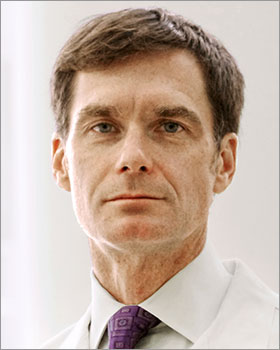
Jason Karlawish, MD, mentors SUMR scholars every year. He’s Co-Director of the Penn Memory Center and an LDI Senior Fellow.
Lane-Fall has been mentoring ever since and ticks off the students who became part of her life. “They’re like my babies,” she said. “After Sophie there was Tyler and Enrique and Jerome and Chris,” she said. “Over the summer, aside from involving them in my research, I help them think through something like a career development plan. I’ve co-authored papers with them, written school letters for them, and stay in touch with all of them.”
Co-Director of the Penn Memory Center and Perelman School Professor of Medicine Jason Karlawish, MD, mentors SUMR scholars each year.
‘Moving scholars and science forward’
“It’s a real thrill to invest time in someone’s life at a critical stage of development where the decisions they make have such a tremendous impact on the rest of their career,” he said. “I can look back on them to see where they are now and what they’re doing, knowing that I can take a little bit of the credit for that. You can see both the scholars and the science they’re so engaged in moving forward and that’s very rewarding to watch.”
Dozens of other faculty members annually express similar feelings. “Mentoring in the SUMR program is one of my favorite ways to ‘pay it forward,'” said Perelman School of Medicine Professor and LDI Senior Fellow Scott Halpern, MD, PhD. “I enjoy devoting time and training and hopefully inspiring the next generation of health services researchers.”
“A key area of importance for health services research,” Halpern continued, “is to identify and surmount disparities in access to and outcomes following health care. We couldn’t possibly meet that goal fully without actively working to diversify the pool of scientists doing this work. The SUMR program is an important component of that.”